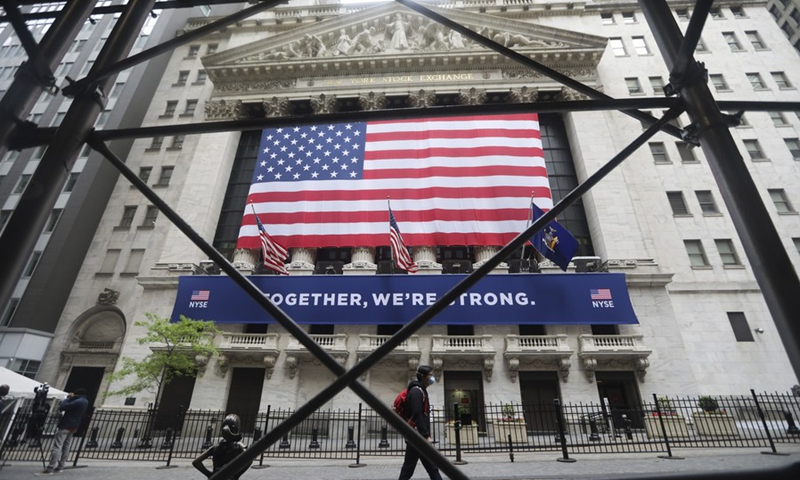Focus
Your Present Location: HOME> FocusUS’ delaying investment ban on China raises concern over tougher curbs
Source: Global Times Published: 2021-05-19
The Biden administration on Tuesday announced a two-week delay of an investment ban on some Chinese companies it claims to be linked to the Chinese military, an extension apparently intended to prepare for a tougher prohibition on such investments.

The delayed revamp of the blacklist, introduced by former US President Donald Trump as part of his hard-line China policy, is essentially an attempt to shoot Wall Street in the foot, Chinese experts said, saying that it augurs ill for bilateral ties, notably in the financial sphere.
Analysts expect more US-listed Chinese companies will shift their listings to markets in China to offset the repercussions of tougher restrictions being weighed by Washington, and they predicted a continued confrontational and rivalry-driven stance toward China under the Biden administration.
However, they downplayed fears of China-US trade relations getting worse or a financial decoupling.
The US Treasury Department revealed in a filing dated Tuesday a June 11 deadline for new US investments in subsidiaries of the companies deemed to be so-called Chinese military companies.
"Until then, the White House is working to clarify how the China investment ban applies to the subsidiaries," Bloomberg reported on Wednesday, citing unidentified sources.
The extension is reportedly intended to clarify the scope of the Trump-era ban. The Treasury had previously set a May 27 deadline for the clarification, according to the Bloomberg report.
The ban, originating from an executive order by Trump in November 2020, seeks to ban US investment in firms the US claims are owned or controlled by the Chinese military.
The ban has baffled Wall Street as it's unclear whether it applies to businesses that may be connected to those blacklisted firms, either as subsidiaries or carrying names that closely match the banned ones, according to media reports.
In a worst-case scenario, the investment ban could be expanded to cover a raft of Chinese businesses, inevitably to the detriment of the affected businesses, Dong Shaopeng, a senior research fellow at the Chongyang Institute for Financial Studies at Renmin University of China, told the Global Times on Wednesday.
Further, it would send ripples through bilateral economic and trade relations, he commented, with the current administration apparently not deviating from the anti-China stance that Trump championed.
The recent removal of Xiaomi from the blacklist after the Beijing-based smartphone maker sued the US government earlier this year doesn't signal a truce when it comes to the imposition of investment restrictions, observers said.
The hostile rhetoric that sees the US increasing its rivalry against China will continue, Gao Lingyun, an expert from the Chinese Academy of Social Sciences, told the Global Times on Wednesday.
A tougher ban tends to put not only Chinese businesses, but the interests of US investors, at stake, Gao said.
In response, as Dong, also an expert advisor for the China Securities Regulatory Commission, put it, many more US-traded companies will seek secondary listings in Hong Kong or pursue IPOs in the domestic market, as the home markets and local investors grow stronger to take on more listings.
"The zeal for US listings will never return," Dong said, forecasting a decline in US-headed Chinese IPOs in both size and frequency.
Industry heavyweights, in particular, would largely refrain from US listings, he continued.
But instead of confronting a financial decoupling, the two economies are likely to embrace a new era Dong termed a "cold cycle", when the US may give Chinese businesses a cold shoulder while the growing strength of China's domestic market is poised to underpin the country's wider-ranging prowess.
In the words of Gao, the investment prohibition isn't tantamount to bilateral trade ties descending into a worse situation, especially when factoring into the equation an additional $52 billion for US chipmaking that US Senate Democratic Leader Chuck Schumer proposed late Tuesday.
The proposal, essentially a "national champion" effort to bolster the US chip sector, might expose Washington to criticism of adopting non market-based industrial policy, according to Gao, describing the chip bill as a more reasonable alternative to sanctions-based bans.
Such commitment to chipmaking would surely escalate the rivalry between the two countries in especially high-tech, but it would spur much healthier competition, unlike the blacklist-oriented approach that benefits none, he remarked.
Looking ahead, China-US trade ties are less likely to get worse, according to Gao, citing inflation woes in the US, which inherently makes it impossible for the US to continue a tariff war that would add more costs for US businesses and consumers, who are already bearing the brunt of runaway prices.
US inflation soared to 4.2 percent in the 12 months to April, the highest since 2008, official data showed.
Please Find us: Twitter: RDCYINST YouTube: RealRDCY LinkedIn: 人大重阳RDCY Facebook: RDCYINST Instagram: rdcyinst
Key Words: China; US; Investment; Curbs























































































 京公网安备 11010802037854号
京公网安备 11010802037854号





